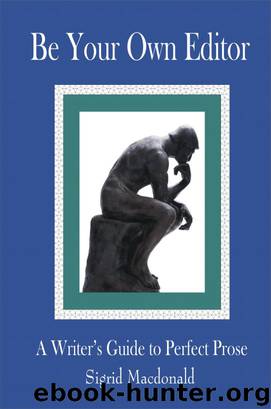Be Your Own Editor: A Writer's Guide to Perfect Prose by Sigrid Macdonald

Author:Sigrid Macdonald
Language: eng
Format: epub, mobi
Tags: a editing, b copyediting, c writing, d creative writing, e essays, f writing articles, g blogging, h rewriting, i help for writers, j writing fiction, k writing nonfiction, l developing characters, m establishing dialogue, n copy editing, o writing tips
Publisher: Sigrid Macdonald
The Question Mark
Obviously, you want to use a question mark at the end of any sentence that poses a question. It sounds like a no-brainer but often enough even the pros forget. In John Grisham’s second blockbuster novel, A Time to Kill, he frequently omits question marks. On page 274, in the sentence, “Why don’t you get it and get dressed,” [Grisham, John, A Time to Kill, paperback edition, page 274, 2009], there is no question mark but there should be.
Likewise on page 282, one of his characters says, “What’s today,” he thought. [Ibid, page 282.] Now that’s a particularly interesting sentence because to begin with, whenever we refer to somebody’s thoughts, we should frame that part of the sentence in italics but Grisham didn’t do that. And there should be a question mark after the word today, so the phrase should actually look like this: What’s today? he thought.
Note that the word he is not capitalized because it is a continuation of the same sentence. The man is having a thought. That is very much like saying something out loud except that we will not add any quotation marks, but rather place the thought in italics, add the question mark and lowercase the pronoun he. I will discuss this further in our section on dialogue.
Some writers aren’t sure what constitutes a question, particularly when the phrase “I wonder” is involved. “I wonder if she’s coming” is not a question. It’s a statement. A question is, “Is she coming?” That deserves a question mark. Any sentence that begins with “I wonder” generally does not warrant a question mark, and there’s no need for you to wonder anymore about it.
Download
Be Your Own Editor: A Writer's Guide to Perfect Prose by Sigrid Macdonald.mobi
This site does not store any files on its server. We only index and link to content provided by other sites. Please contact the content providers to delete copyright contents if any and email us, we'll remove relevant links or contents immediately.
Asking the Right Questions: A Guide to Critical Thinking by M. Neil Browne & Stuart M. Keeley(5775)
Autoboyography by Christina Lauren(5235)
Eat That Frog! by Brian Tracy(4536)
Dialogue by Robert McKee(4400)
Sticky Fingers by Joe Hagan(4197)
Journeys Out of the Body by Robert Monroe(3624)
Annapurna by Maurice Herzog(3467)
Full Circle by Michael Palin(3449)
Schaum's Quick Guide to Writing Great Short Stories by Margaret Lucke(3380)
Elements of Style 2017 by Richard De A'Morelli(3349)
The Art of Dramatic Writing: Its Basis in the Creative Interpretation of Human Motives by Egri Lajos(3067)
Atlas Obscura by Joshua Foer(2961)
Why I Write by George Orwell(2952)
The Fight by Norman Mailer(2940)
The Diviners by Libba Bray(2937)
In Patagonia by Bruce Chatwin(2928)
The Mental Game of Writing: How to Overcome Obstacles, Stay Creative and Productive, and Free Your Mind for Success by James Scott Bell(2908)
Venice by Jan Morris(2573)
The Elements of Style by William Strunk and E. B. White(2473)
